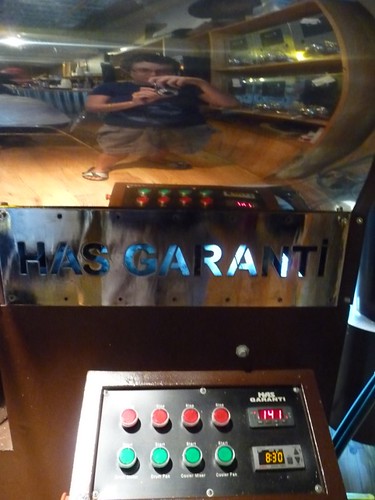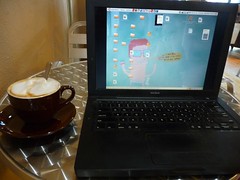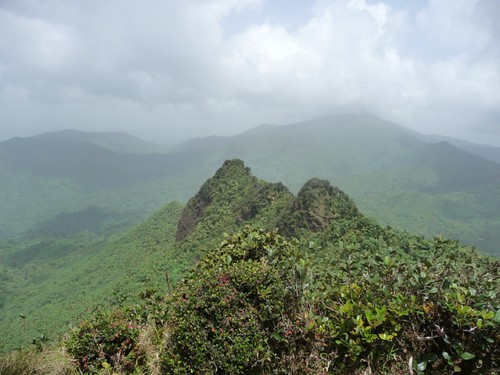NYC has serious office shortages (my home institution truly suffers from this). NYC also has a lot of old subway cars. Put the two together and you get magic and a solution.
The name of the game: conversion
Code is Speech: Legal Tinkering, Expertise, and Protest among Free and Open Source Software Developers
After quite a few years of work, revisions, procrastination, and a few life changes, I have finally published a lengthy piece in Cultural Anthropology on code and speech entitled “Code is Speech: Legal Tinkering, Expertise, and Protest among Free and Open Source Software Developers, published in Cultural Anthropology. Debian figures pretty prominently as does the arrests of Jon Johansen and Dmitry Sklyarov and the DeCSS Haiku
update: If you have access to a University library, you can get it now. If you don’t, it will be available for free (as in beer) in a few months, and I might also post an uncorrected proof (as I believe I have permission to do so) or can send it to you if you request it. I have posted the pre-print proof here. Since these are the uncorrected proofs, there are a few minor mistakes.
Though published, this is also, much like software, a work in progress as the material represented here will also be in my book and the good news, is I can seriously expand on the issues I have raised. So I am looking for interested readers for feedback, which will thankfully make it in a book that I can post here.
Abstract below:
In this essay, I examine the channels through which Free and Open Source Software (F/OSS) developers reconfigure central tenets of the liberal tradition—and the meanings of both freedom and speech—to defend against efforts to constrain their productive autonomy. I demonstrate how F/OSS developers contest and specify the meaning of liberal freedom—especially free speech—through the development of legal tools and discourses within the context of the F/OSS project. I highlight how developers concurrently tinker with technology and the law using similar skills, which transform and consolidate ethical precepts among developers. I contrast this legal pedagogy with more extraordinary legal battles over intellectual property, speech, and software. I concentrate on the arrests of two programmers, Jon Johansen and Dmitry Sklyarov, and on the protests they provoked, which unfolded between 1999 and 2003. These events are analytically significant because they dramatized and thus made visible tacit social processes. They publicized the challenge that F/OSS represents to the dominant regime of intellectual property (and clarified the democratic stakes involved) and also stabilized a rival liberal legal regime intimately connecting source code to speech.
Biella’s Guide to PR: Cafe con Leche
What would life be without coffee? It frightens me to entertain a life without the stuff as it is one my most favorite things in the world. Some nights I am excited to go to bed just so I can wake up and have my cup of joe (I am not one of the Fortunate Ones who can drink coffee at night).
A few mornings a week I decide I would rather sit at a coffee shop to sip on my morning joe and I am quite lucky in this regard because I live down the street from what I think is the best local coffee shop in the metropolitan area: Hacienda San Pedro, which is also a local plantation, one of the many you can visit for the day.
They roast their coffee on premises (which they are doing right now) in a very cool old fashioned looking roaster, also pictured above, which they seem to do between 7 AM and -8AM when I tend to be here. When you step outside after the roasting you walk through a billowing and light poof of coffee smoke, which is like being blessed by the gods of coffee before starting your day.
The great thing about the coffee aside from its taste is the price. The cup featured below is around $ 1.60 which beats the 3 dollars you would pay at a Starbucks, which have, in the last 3 years, infested and infected the island. Given that so much coffee is grown here, it is great to see these sorts of places sprout and serve the local stuff.
They have a good selection of baked goods for b-fest, free wireless (yay!), and great music playing, usually something like Silivio Rodirguez or some reggae. After you are done, you can head to the museum right down the street, which not only has a great collection of local and international art, but a great peaceful garden, and one of my favorite murals.
The coffee shop is located at Avenida De Diego #318 (though there is no number out front, but there is a banner). Basically it is between the highway overpass in Condado, which is right next to the art museum and a large avenue called Ponce de Leon, which resides in the heart of Santurce.
Currently, they are open Mon-Friday from 6:30 to 6, on Sat open from 9 to 3:30 and closed on Sunday.
Academic Publishing
Last spring I secured a Creative Commons license for my book, which is under contract with Princeton University Press. It was was a huge relief for me as I want to publish with PUP but knew there was a serious contradiction if I published a book on Free Software under a copyright license (sort of like printing a Hindu prayer book on leather…).
This article in the chronicle Saving Texts From Oblivion, which opens with a fascinating though unsurprising finding, points to other reasons why an open license is a sensible thing to do, that is, if you want students to read your book:
At a focus group in Oxford University Press’s offices in New York last month, we heard that in a recent essay assignment for a Columbia University classics class, 70 percent of the undergraduates had cited a book published in 1900, even though it had not been on any reading list and had long been overlooked in the world of classics scholarship. Why so many of the students had suddenly discovered a 109-year-old work and dragged it out of obscurity in preference to the excellent modern works on their reading lists is simple: The full text of the 1900 work is online, available on Google Book Search; the modern works are not.
The article, written by Oxford’s editor, has an interesting set arguments about why to support the Google book settlement. It does not, however, really address the question of book piracy, which if anyone has taken a minute to explore, will notice that it is a booming underground economy and the quality of the books is utterly fantastic.
Given these conditions: what will the academic publishers do? No one, at least in academia, wants them to go under and yet conditions have made it difficult for them to survive. I do hope that some interesting solutions, with the financial aid of university support (after all, many are calling for open access) are hacked up.
Calling for tighter copyright controls as this famous judge has done in the case of newspapers is not the path that I hope anyone entertains. In fact, releasing books after a year or two under a CC license might be one path to take, along with providing affordable e-books so that those who do want to support authors and books buy them instead of hitting the pirate stands.
Biella’s Guide to Puerto Rico: El Yunque, The “Rock” and Luquillo
Every island kid has been dragged at least once, probably multiple times, to the meandering roads that eventually lead to the Puerto Rican National Rain Forest, El Yunque. One can leave the bustling capital and in about 1 hour find yourself in the smack middle of a tropical rainforest. Once there, you can check out the falls, take a dip in one of the pools “charcos” or take a more challenging hike to reach one of the handful exposed rocks where there are stellar views of the forest and beyond.
I have many memories of this place, most of them great. My parents used to drag me and my sister there at least once a year to “ohh and ahhh” at the small waterfalls on the side of the roads. On occasion we would hike for all of 20 minutes before heading to the beach. In high school, my friends would visit occasionally and then when I worked for an environmental camp after I graduated from high school, I found myself there for days, sleeping under the soggy skies and amidst the unbelievably loud coquis (who sing to mark their tiny territory and attract the ladies, naturally).
Now, like most things on this island, there are serious mistakes to be made when doing anything, whether it is going to the movies (as Micah and I found out last night) as well as hitting the rainforest. All of this is due to one problem: this island is uber-populated and everyone also naturally loves to do stuff…. so the name of the game is often crowds and crowds and crowds.
So, first lesson about El Yunque: If you can avoid going on the weekend, absolutely do so, especially during the summer. It will be much easier to find parking (which is often on the side of the road) and the trails will be less crowded (though that means less chance of hearing some 13 year old kid screaming that he found the Chupacabra, as we were so lucky to hear today). But if you plan on swimming in one of the watering holes/falls, I would avoid the weekend like the plague. Well unless you love swimming in the midst of screaming, though admittedly quite joyful, kids.
Once you enter the preserve, it is worth your while to go to the visitor’s center, which costs a few bucks per person (the park cost nothing to get in, but well, giving a few bucks to a rainforest seems like right thing to do). There you can learn a little more about its history, get a map, and get a first view of the forest since the center is architecturally as it should be: open and airy so it basically bleeds into the canopy of trees.
If you want to hike, there are a handful of trails and many are paved but the longer, more challenging ones are not. The two I recommend are The Trade Winds Trail (which is like not officially kept up, but is kick ass) and El Yunque Trail.
Finding the Trade Winds Trail is a little tricky as it at the end of the road behind the yellow gates and then you have to walk a few more minutes until you see this sign. Here are some more detailedinstructions for finding it. I have slept on this trail, have hiked for 5 hours on it without seeing a soul, and apparently it is even longer…
Another trail, which is definitely worth a whirl, is the El Yunque Trail. There are great instructions if you follow the previous link so I won’t repeat them here. What I like about this is that there is 1) a pygmy forest (I just like saying that phrase) and a grand slam ending, with a beautiful view and when it is totally clear (today was not so clear as the Saharan sands, for reals, were in the air), you can see to the ocean. If it is not clear, it is still pretty nice and in fact, being in the middle of a cloud is just as enchanting as a clear sky and good views.
Biella’s Guide to Puerto Rico
Although I really appreciate sites like Wikitravel, I often find the entries frustratingly thin. Everything is noted but without much emotion or elaboration,which is of course their stylistic format, which makes total sense. But let’s face it: it is hard to read through the lines and figure out what one MUST do in the three days they are in whatever location. There is just very little meat to sink your teeth on, especially when needing to make some quick decisions about what to do and what not to do.
Since I am in Puerto Rico for the rest of the summer and I have traveled up and around the island many times, I thought I would dedicate part of this blog to Biella’s Guide to Puerto Rico. For those that will never visit, you can ignore the series of posts though I do plan on peppering with information that might nonetheless be interesting or not, depending, I guess on my narrative.
I will mostly concentrate on what I will be doing this summer, which is only a small fraction of what I have done and what there is to do since I am for the most part, parked in front of this very computer writing a book. But the mind needs its rest and for me rest means playing at the beach, in the forest, in caves, and listening to some good music. So in this spirit, I will start with today (separate post) as I went on a hike in the national rain forest of the island, El Yunque and the beach Puerto Rican’s love to frequent, Luquillo.
If you ever have wondered
Fieldwork: it is THE method used by anthropologist and is often treated as a loosey goosey set of experiences and techniques, partly because it is. But only partly. If you have ever wanted to read more about fieldwork, my friend Alex Golub has written an interesting account of fieldwork in terms of two realizations.
Slides/Video Open Video
Here are my slides from the Open Video Conference. I am not sure they are intelligible on their own but I imagine the video of the talk will be up on the site at some point in the near future. It is a basic overview of an article coming out in August in Cultural Anthropology entitled “Code is Speech: Legal Tinkering, Expertise, and Protest among Free and Open Source Software Developers (no lolcats in the article though, sadly).
The conference was a real interesting event with some great keynotes, panels, and conversations. I was, at first, surprised at the level of attendance, but it is a testament to the vibrancy of the state and promise of open video. I have a feeling that it will be the first of many.
update Videos of the talk are being uploaded here and a host of the recordings are already up here, which are in a non-flash format and apparently for my talk, they were able to capture a plof (that made me laugh early this morning when i could barely even open my eyes):
“More important: the official registration didn’t capture the sound of a bag of crisps that opened with a loud ‘plof’ on the third row.”
Cross-Cultural Memes
The talk on memes and especially cross-cultural memes at open video conference has been great. Def worth watching.
Politics and Poetics of DeCSS
My slides are thankfully done for open video conference. Thankfully so I can go see the talks tomorrow, which you all should do if you are in town!






